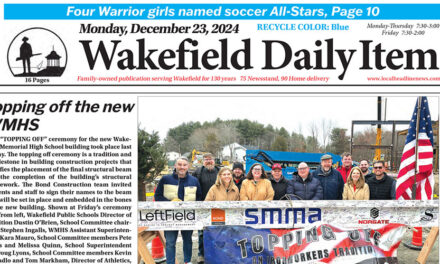Published in the July 14, 2017 edition.
By DAN TOMASELLO
LYNNFIELD — An organization committed to fighting for suburban issues came to an end last week.
The Suburban Coalition made the difficult decision to dissolve at the group’s annual meeting at the Lynnfield Public Schools’ Central Administrative Offices July 10. The coalition was a statewide organization comprised of local officials that advocated for strengthening local services and securing more state funding, particularly for Chapter 70 education aid. Additionally, the group worked with state officials to advocate for local issues.
Founded in the 1980s after Proposition 2½ was enacted, the Suburban Coalition was the only statewide organization that brought together selectmen, school committees, finance committees and other officials to advocate for cities and towns. The group frequently advocated on behalf of municipal issues with state legislators and gubernatorial officials. The bipartisan coalition did not support parties or individual candidates.
Lynnfield School Committee Vice Chairwoman Dorothy Presser served as the Suburban Coalition’s president for many years. She said dissolving the coalition was a difficult decision.
“The Suburban Coalition is an all-volunteer organization,” Presser wrote on the group’s website. “For the last three years, we have been unable to find enough volunteers to carry out our mission in a sustainable manner. Therefore, the officers believe it is now time to discuss dissolution.”
Presser’s proposal to dissolve generated a great deal of discussion during the meeting.
“I feel like this is a bad time to dissolve,” said Walpole School Committee member Nancy Gallivan.
Harvard Selectman Stuart Sklar said the group’s members have become “stretched thin” due to balancing their local responsibilities along with the coalition’s responsibilities. He said he was pleased a large number of cities and towns signed onto the coalition’s resolution calling for the State Legislature to implement recommendations outlined by the Massachusetts Foundation Budget Review Commission (FBRC). The FBRC was established by the State Legislature as part of the fiscal year 2016 state budget and was tasked with examining the Chapter 70 funding formula. The commission issued a report in the fall of 2015 identifying two areas, employee health insurance and special education, where the Massachusetts Foundation Budget significantly understates the true cost of educating students in the commonwealth.
“We got a lot of towns to sign that, including multiple boards,” said Sklar. “It is helpful having someone push that agenda. It took us seven years to have a commission, and the commission worked for two years.”
Presser agreed, but noted many boards believed the Massachusetts Association of School Committees (MASC) sponsored the resolution.
“It was very gratifying to have that resolution passed by so many committees,” said Presser.
North Reading School Committee Chairman Mel Webster said the coalition has made a positive impact pushing Chapter 70 reform over the years. He commended former North Reading School Committee Chairman and coalition member Cliff Bowers for being a staunch advocate for Chapter 70 reform both at the state and local level.
“I think it’s had an impact,” said Webster. “Our committee is pretty active. We have pushed a lot of things in North Reading and have been pretty aggressive. But without that that reminder that you have to get your committee involved, my worry is where is that going to come from. I feel like the Suburban Coalition got us to rally a lot.”
Presser said she was pleased the coalition’s message resonated in North Reading, but said other committees have not embraced that mantra.
Webster said the coalition’s meetings were incredibly valuable.
“I couldn’t put a value on those meetings,” said Webster. “You got to talk to other school committee members and got to hear about what was going on with the state budget. Can MASC sponsor meetings like that?”
“Sure,” said Presser.
Lynnfield resident Wally McKenzie, a strong supporter of the group, said cities and towns “need the Suburban Coalition.” He said the coalition has repeatedly reached out to other boards to get them involved with the group. However, he said the outreach efforts were not successful.
“We haven’t been able to find that one or two people who have that 110 percent to keep it going,” said McKenzie.
In response to a question from Webster about a proposed hiatus, Presser recalled she urged the coalition’s former president, Jerry Wasserman, that the coalition needed more volunteers.
“I told Jerry we needed help and more people volunteering,” said Presser. “We haven’t been able to find that.”
Amesbury School Committee member Amy Sherwood agreed.
“It’s amazing to me that people are so geared up at the national level, but getting people to do the work at the local level is really difficult,” said Sherwood.
After further discussion, the coalition voted unanimously to dissolve. Additionally, the group voted to donate the remaining $11,500 in the coalition’s account to the Massachusetts Budget and Policy Center.
Webster said having the coalition come to an end is unfortunate, but said there could be a silver lining on the horizon.
“I think it has been a valuable group because of its focus on suburban issues,” said Webster. “Sometimes dissolving something that people find important but don’t realize it is important until its gone leads to another group being formed. There is always that possibility.”
“I like that optimism,” said Presser.
The coalition’s members also praised Presser’s efforts spearheading the group’s initiatives.
“Dorothy has done a great job,” said Sklar. “I hate seeing something that has lasted so long go, but I strongly believe the reason for the Suburban Coalition forming is just as strong if not stronger now. Suburban towns have gotten screwed in the past and will continue to do so because we don’t have the votes to get things done. That is why we were formed.”




